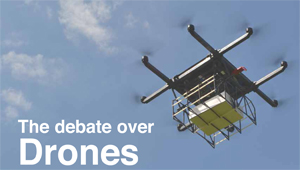By Marco Procaccini
Drones delivering packages to customers. It sounds like the world of science fiction or secret military operations, not the down-to-Earth everyday work of Teamsters. But that is changing, and Local 213 members should take notice.
Business Rep Kimm Davis represents members working for UPS, Purolator, and other delivery and courier services in B.C. “We know technological progress displaces workers,” she said. “Jobs may not be entirely eliminated, but they are going to change. The local union must look at ways to improve the language in our collective agreements to encompass the impact of future technology and that allows our members to capitalize on this technology.
“The risk is that our members will be unable to contribute economically to their communities when we’re already seeing a declining middle class. The workers know the value of a dollar, but companies don’t seem to know the value of human beings,” she said. “Technology takes the human factor out of so many transactions and decisions.
“A drone doesn’t invest in the community or pay taxes or raise a family. Now every time you go into a Safeway, Save On Foods, Canadian Tire, etc. you see fewer cashiers because the companies have installed another self-serve kiosk.”
Any direct link between commercial drone use and job loss is still unclear. Proponents of the new technology insist its primary purpose is to assist delivery drivers and operators, not to replace them.
However, since the federal government began funding a drone development program with engineers from Ontario’s University of Waterloo and University of Toronto in 2010, there has been growing interest from the commercial sector that sees the potential profit. Canada has not yet developed regulations for commercial drone operations. However the federal government did approve rules and safety guidelines for recreational use in March 2017.
Read more on Pg. 18 of Today’s Teamsters Fall 2017

